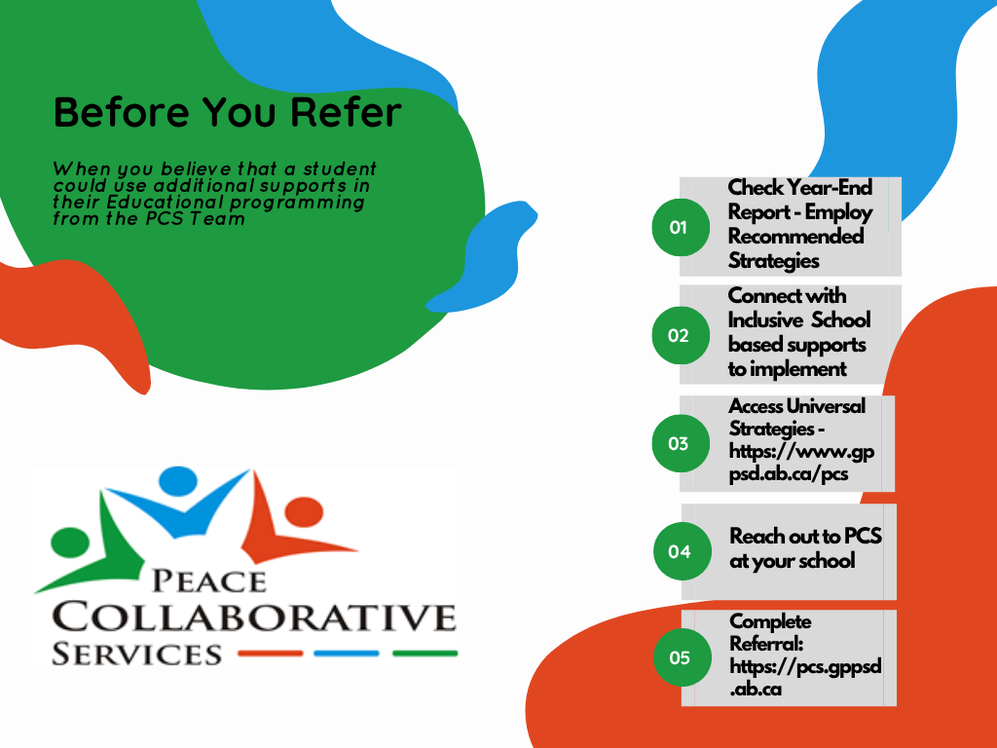Before You Refer

Referrals to the PCS Team
Referrals to the PCS (Peace Collaborative Services) team should be initiated by school division personnel as part of a collaborative, school-based approach to supporting students in achieving their fullest potential in an educational setting.
Who can initiate a referral:
- Classroom Teachers, in collaboration with:
- Parents/Guardians
- Inclusive Education Coordinators
- School Administration
- Educational Assistants (as part of a team discussion)
- Other members of the Peace Collaborative Services Team
PCS involvement typically follows the implementation of universal supports. When additional needs are identified and targeted or specialized interventions are required, the school-based team may consult PCS professionals for further support.
Each school division will determine who the Most Responsible Teacher or designee will be to enter prioritized referrals into the PCS Information Management System (PCS Database).
Consider a referral when a student:
- Has a diagnosed hearing loss (mild to profound), including those using hearing aids or cochlear implants
- Struggles to hear or follow instructions in classroom settings, even with supports
- Shows delays in language, communication, or auditory processing
- Frequently asks for repetition or appears disengaged during verbal instruction
- Requires support with personal hearing equipment (e.g., FM/DM systems)
- Needs strategies to improve listening skills, self-advocacy, or social communication
- Recently experienced a change in hearing or received a new diagnosis
Consider a referral when a student:
- Has a diagnosed vision impairment (low vision, blindness, or progressive condition)
- Is struggling to access printed materials or visual content in class
- Squints, tilts head, or sits very close to screens/books
- Has difficulty navigating the classroom, hallways, or playground safely
- May benefit from instruction in Braille, screen readers, or assistive technology
- Requires adapted learning materials (large print, tactile tools, audio formats)
- Needs support with visual fatigue or sensory integration related to vision
Consider a referral when a student:
- Is not meeting developmental speech milestones, such as continuing to use baby talk or unclear speech past the expected age (e.g., says “wabbit” for “rabbit” or “fumb” for “thumb” beyond age 5)
- Has difficulty being understood by unfamiliar listeners, even in short phrases or sentences
- Struggles to follow instructions or understand classroom language
- Has limited vocabulary or difficulty forming sentences and expressing ideas
- Shows frustration when trying to communicate or is often misunderstood
- Has difficulty with social communication (e.g., making eye contact, taking turns in conversation, using gestures appropriately)
- Is non-verbal or uses alternative communication (e.g., visuals, gestures, AAC devices)
- Has an existing diagnosis (e.g., speech-language delay, apraxia, autism spectrum disorder) and needs support with communication development
Consider a referral when a student:
- Is significantly struggling with reading, writing, math, or focus despite classroom support
- Displays frequent behaviour challenges that interfere with learning
- Has difficulty regulating emotions or coping with stress, anxiety, or peer interactions
- May need a psychoeducational assessment to better understand learning strengths and challenges
- Requires programming adaptations beyond typical classroom differentiation
- Is suspected of having a learning disability, ADHD, autism, or developmental delay
- Has experienced trauma, loss, or emotional distress affecting school performance
- Needs support with classroom or behaviour planning, or when staff need consultation on how to best support the student
Consider a referral when a student:
- Has difficulty with printing, pencil grasp, or using scissors and other classroom tools
- Shows sensory sensitivities to noise, touch, or movement that interfere with learning
- Has delays in self-care tasks like dressing for recess, eating, or toileting
- Struggles with transitioning between classroom tasks or routines
- Has difficulty using or accessing learning technology such as keyboards, tablets, or adapted tools
Consider a referral when a student:
- Has difficulty moving safely around the school, including using stairs or navigating hallways
- Struggles to keep up with peers in gym class, physical education, or on the playground
- Needs frequent support to sit, stand, or transition between floor, chair, and standing positions
- Uses mobility aids or assistive equipment and may require recommendations or training
- Demonstrates balance, coordination, or endurance challenges that limit school participation
